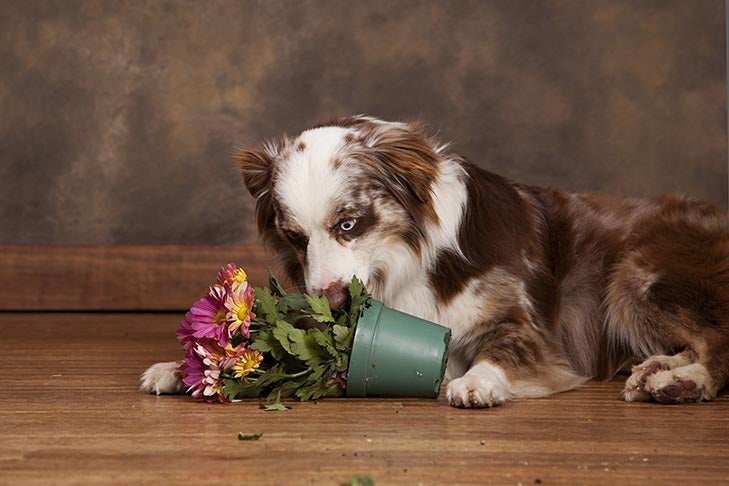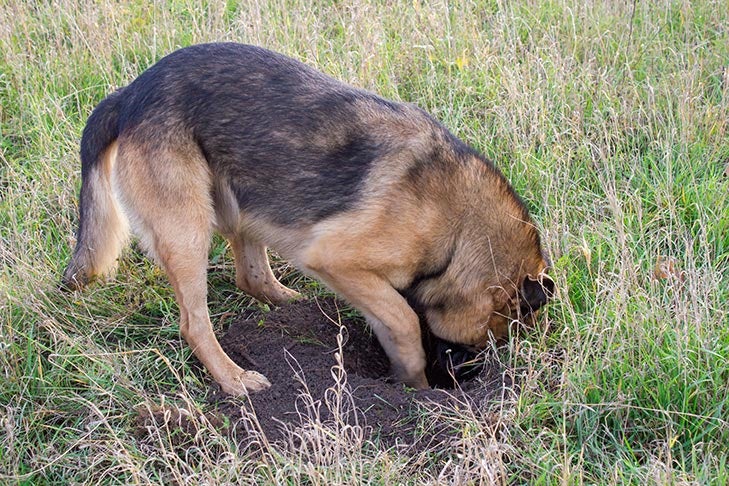Clubs Offering:
As a pet owner, you may have caught your dog eating (or attempting to eat) some pretty weird stuff. But have you ever observed your pet snacking on straight-up dirt?
Holistic veterinarian Dr. Laurie S. Coger, DVM, explains, “Dirt eating is a form of what is termed ‘pica,’ the ingestion of nonfood materials. There are many causes, including nutritional, behavioral, and physical. Stress or boredom can also lead to eating all sorts of things, including dirt.”
If your dog is continually eating dirt, you shouldn’t discount this behavior. It could be a sign of a bigger issue, such as:
Dr. Coger notes that while stomach and gastrointestinal issues could be to blame for your dog’s interest in dirt, canines are more likely to seek out grass in these cases. “If [the dirt eating] is frequent, intense/manic in nature, or large quantities are consumed, then it’s time to go to the vet,” she says. “Changes in stool would be another sign that a vet visit is in order. Bloodwork to look for underlying abnormalities may be helpful in pinpointing a cause.”

As you may expect, there are risks to letting your dog continually eat dirt. The main risk is impaction of the intestine (hardened stool that gets stuck in the body due to long-term constipation) if your dog eats a lot at once. Impaction often means surgery. “
The dirt could also contain pesticides, fertilizers, or other toxins that could reach toxic levels if enough dirt was ingested,” Dr. Coger adds. “Depending on the dirt, dental damage or wear could also be a concern.” If the dirt has rocks in it, for example, it could cause damage to your dog’s teeth and cause obstruction in the throat or any point along the digestive tract. Sharp sticks could puncture the linings of your dog’s mouth, throat, intestine, or stomach. It’s also possible that your dog could ingest a parasite along with the dirt, which can cause a range of additional health issues.
“I would add that any new, unnatural behavior, such as dirt eating, should be acted upon quickly,” Dr. Coger says, “both because of possible serious underlying causes and before it becomes a habit. Dogs will learn from other dogs in the house, and who wants a houseful of dirt eaters?”

If you’re worried that your dog’s dirt eating is due to a nutritional imbalance, you should consult your veterinarian about your canine companion’s diet and whether changes need to be made. On the behavior side, make sure your dog is getting enough physical and mental exercise to curb dirt eating that stems from boredom. If all else fails, “denying access to favorite dirt-eating areas may be required,” Dr. Coger says. Remember, dirt eating may be a sign of something bigger, so you should never ignore it.
Why Does My Dog Eat Dirt?
Your dog’s desire to eat dirt may be caused by nutritional, behavioral, or medical reasons.
All dog foods are not created equally. Some diets do not contain all the nutrients that a dog needs to live a healthy lifestyle.
Dietary deficiencies can cause dogs of any age to eat dirt to obtain minerals, like sodium, iron, and calcium from the soil. Dogs that are underfed may also eat dirt and other objects due to hunger and nutritional deficiencies.
When selecting a good quality dog food, make sure the food you choose meets the World Small Animal Veterinary Association (WSAVA) nutritional guidelines and is made by a large, experienced, and reputable manufacturer. Brands such as Royal Canin, Hill’s Science Diet, and Purina all meet WSAVA guidelines.
Dogs can get bored if they don’t have enough exercise or enrichment, and some will eat dirt to occupy their time.
Dogs with separation anxiety may eat dirt due to stress when they are separated from their pet parents. Dogs can develop anxiety at any age.
Several medical issues can also cause dogs to want to eat dirt.
This medical condition refers to a low red blood cell count. Anemia can be caused by a variety of things, such as hookworms, flea infestation, tick disease, cancer, immune-mediated diseases, or bleeding disorders.
It is more common for puppies to have hookworms since they can typically contract these parasites through their mother’s milk when nursing. However, dogs of any age can get hookworms from the environment if they are not on heartworm prevention.
All dogs are prone to fleas and ticks, which are blood-sucking parasites that can cause severe anemia. Keep your dog on a good flea/tick prevention year-round, such as Simparica, NexGard, or Bravecto.
Adult and senior dogs can develop a severe anemia due to internal bleeding from certain types of cancerous masses. Immune-mediated diseases and bleeding disorders are very rare but can also cause anemia in a dog of any age. Any anemia, if severe enough, can cause a dog to eat dirt.
A shunt is an abnormal blood vessel that allows blood to bypass a dog’s liver. As a result, the liver receives an inadequate blood supply and does not function properly. Shunts are rare but can be congenital (in puppies) or seen in adult or senior dogs.
When dogs have an upset stomach, they sometimes eat dirt and/or grass to try to make themselves vomit.
Is Eating Dirt Bad for Dogs?
Absolutely! Eating dirt can pose a variety of problems for dogs. Eating clumps of dirt, mud, or other objects can pose a choking hazard. Chewing and consuming hard objects, like rocks and animal bones that may be mixed in with the dirt, can also fracture teeth.
Aside from the more obvious dangers, here are some others that you may not be aware of.
Dirt, rocks, sticks, or other objects, also called foreign bodies, can get stuck in a dog’s esophagus, stomach, or intestines. This is called a gastrointestinal obstruction. Surgery is often needed to treat an obstruction.
Symptoms of an obstruction can include:
As soon as you see your dog ingest a foreign body, call your local animal hospital or emergency vet hospital immediately. A veterinarian may have you bring your dog right to the hospital so that vomiting can be induced to prevent possible obstruction. Timing is crucial. You must get your dog to a vet within an hour of ingestion of the foreign material because a dog’s stomach usually empties within two hours.
Another risk of eating dirt or grass is that it may contain pesticides, fertilizers, or other toxins that can be severely harmful to your dog.
If you see your dog eating dirt from a lawn that may have been treated with pesticides or fertilizer, call the Pet Poison Helpline at 855-764-7661 or ASPCA Poison Control at 888-426-4435 immediately.
There is a fee for calling either of these helplines, but you will be advised on whether or not your dog needs immediate medical care. You will also receive a case number that you can give to your local vet or emergency vet.
Dirt and rocks may also cause abrasions and inflammation to the lining of a dog’s gastrointestinal tract as they work their way down the esophagus, into the stomach, and through the intestines.
Dogs that eat dirt are also more prone to ingesting soil-dwelling parasites, such as Capillaria, Giardia, hookworms, roundworms, and whipworms. They may also ingest fleas that are on the ground, which can transmit a parasite called tapeworms.
Why Does My Dog Eat Grass and Dirt?
Why did my dog just eat that? As a dog parent, you’ve probably asked this question at some point, whether your dog ate a stick, a rock, or dirt. Consuming objects that are not food-related is an eating disorder called pica. A form of pica called geophagia causes dogs to purposely eat dirt or mud.